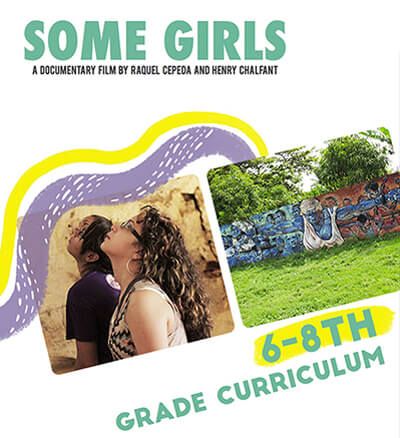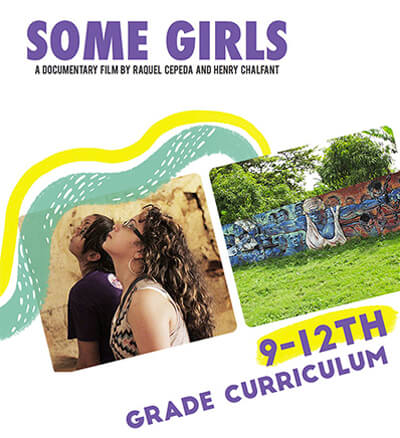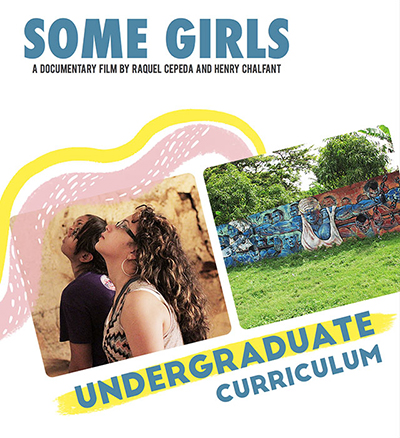The Film
SOME GIRLS is a feature documentary that explores issues of identity within the Latina-American community by focusing on a group of troubled teenage girls in a Bronx-based suicide prevention program who feel rejected by mainstream America, but are transformed through an exploration of their roots, followed by a trip to the seat of the Americas. On that journey to modern-day Dominican Republic, the white supremacist narratives about American history they’ve been taught are challenged, leaving them free to re-construct their own respective identities. What does it really mean to be American? And, more importantly, what does that look like?
Driven by severe identity issues linked to depression, culture and societal baggage, Latina teens have the highest suicide and suicide ideation rates in America. The statistics are disturbing: Nationally, one in seven Latina teenagers will attempt suicide. This trend has remained steady for more than a decade with Latina-Americans having much higher suicides and suicide ideation rates those of their white and Black counterparts. New York City, where the film is primarily shot, is the epicenter of this startling trend. According to the Center for Disease Control (CDC), Latina-American teens generally attempt suicide at rates far greater than their non-Hispanic counterparts in New York City – more than twice the rate of white youth (14.7% versus 6.2%) and 44% more frequently than teenage African-American girls (14.7% versus 10.2%). And the numbers, from the time we started filming five years ago to now, have only gotten worse.
As the documentary unfolds, the film’s protagonists begin to develop a curiosity about where their ancestors come from. Ostensibly, they are Dominican, Puerto-Rican, Central and South American. However, Latinxs, being the genetic circumstance of the Columbus arrival to the New World, are more than what meets the eye. And, by reconsidering American history from the point of view of the hunted, rather than the hunter, SOME GIRLS challenges the whitewashed accounts taught to children across the nation.
Download our FREE SOME GIRLS companion curricula as .PDF files at the links below, and make sure to hashtag us on social media and/or drop us a line here.
The Team
RAQUEL CEPEDA | Director, Producer, Narrator
Born in Harlem to Dominican parents, award-winning journalist, podcaster, and documentary filmmaker Raquel Cepeda is the author of Bird of Paradise: How I Became Latina. Equal parts memoir about Cepeda’s coming of age in her beloved New York City and Santo Domingo, and detective story about her journey to discover the truth about her ancestry, the book also looks at what it means to be Latinx in a society unwilling to venture past the Black- and white-American binaries dominating our conversations about race, identity, and belonging. Cepeda’s latest film, Some Girls, shot over the course of five years, follows a group of troubled Latina teens from a Bronx-based suicide prevention program transformed by an exploration of their roots via the use of ancestral DNA testing, critical rethinking about American history and how we learn it, followed by a trip to the seat of the Americas. She resides in New York City with her husband, filmmaker Sacha Jenkins, daughter djali, and son, Marceau. To read more about Raquel Cepeda, visit her at www.djalirancher.com
HENRY CHALFANT | Producer
Award-winning documentary filmmaker, artist, and producer Henry Chalfant co-authored numerous books including the definitive account of New York graffiti art, Subway Art, and a sequel on the art form's worldwide diffusion, Spray Can Art. Chalfant co-produced, and did the background research and photo-documentation for the Sundance award winning film, Style Wars, first shown on PBS television in 1984. Chalfant directed and won an Alma award in 2006 for From Mambo to Hip Hop, a film about the musical history of the South Bronx, and directed and produced the seminal documentary Flyin’ Cut Sleeves in 1993, and Visit Palestine: Ten Days on the West Bank. He resides in New York City with his wife, the actress Kathleen Chalfant. To read more about Henry Chalfant, visit him at www.henrychalfant.com
SAM POLLARD | PRODUCER
Producer Sam Pollard is one of the most respected names in the world of documentary cinema, the recipient of an Oscar nomination and multiple Emmy awards. He produced the HBO documentaries Four Little Girls, When the Levees Broke: A Requiem in Four Acts, If God is Willing, and Da Creek Don’t Rise. Pollard directed the acclaimed documentary Slavery by Another Name, which premiered at the Sundance in 2012, and subsequently aired on PBS. He also directed four episodes of PBS’s American Masters, including, Wilson: The Ground on Which I Stand, and two installments of the groundbreaking series Eyes on the Prize. Pollard edited the documentaries Sinatra: All or Nothing at All, Joe Papp in 5 Acts, By the People: The Election of Barack Obama, Pete Seeger: The Power of Song, and Feel Like Going Home, part of The Blues series presented by Martin Scorsese. Since 1994 Pollard has served on the faculty of New York University’s Tisch School of the Arts. He is a member of the Academy of Motion Picture Arts and Sciences.
HAROLD MOSS | ANIMATION DIRECTOR
Harold Moss has spent his career fusing storytelling, technology and a passion for change-making media. Notably, Harold created the three-minute cartoon “A Brief History of the USA” in Michael Moore’s Academy Award–winning Bowling for Columbine (2003), and was a producer of the 2008 Sundance Grand Jury Prize–winning and Oscar-nominated documentary, Trouble the Water. He has provided animation direction for Moore’s Fahrenheit 9/11, Joe Cross’s Fat, Sick & Nearly Dead documentaries, and Drunk Stoned Brilliant Dead: The Story of the National Lampoon. To read more about Harold Moss, visit him at www.flickerlab.com
BOBBY SANABRIA | ORIGINAL SCORE
Bobby Sanabria, who created an original score for Some Girls, is a drummer, percussionist, composer, arranger, recording artist, producer, filmmaker, conductor, educator, activist, multi-cultural warrior and multiple Grammy nominee. Sanabria has performed with a veritable “Who’s Who” in the world of jazz and Latin music, as well as with his own critically acclaimed ensembles. His diverse recording and performing experience includes work with such legendary figures as Dizzy Gillespie, Tito Puente, Paquito D’Rivera, Charles McPherson, Mongo Santamaría, Ray Barretto, Marco Rizo, Arturo Sandoval, Roswell Rudd, Chico O’Farrill, Candido, Yomo Toro, Francisco Aguabella, Larry Harlow, Henry Threadgill, and the Godfather of Afro-Cuban Jazz, Mario Bauzá. He composed an original score for the Alma award-winning ITVS documentary, From Mambo to Hip-Hop.
-
In The Thick Show May 31, 2019
The documentary “Some Girls” tackles the issue of mental health in young Latinas in America. Maria and Julio talk to ITT All-Star Raquel Cepeda, author and documentarian, about her film and how mental health is connected to beauty standards and cultural identity.
READ MORE
-
Cat Cardenas May 29, 2018
By making the movie available to stream and the curriculum free to download, Cepeda hopes to have a wider impact on Latinas across the country.
READ MORE
-
Luria Freeman May 15, 2017
Cepeda is on a mission to destroy the U.S.'s overwhelming black-white binary and amplify the voices of Latinxs in America.
READ MORE
-
Latina Magazine Sep 26, 2017
"This Powerful Documentary Offers a Much-Needed Look Into Latina Identity, Depression and Self-Harm"
READ MORE
Photo by Rob Northway



